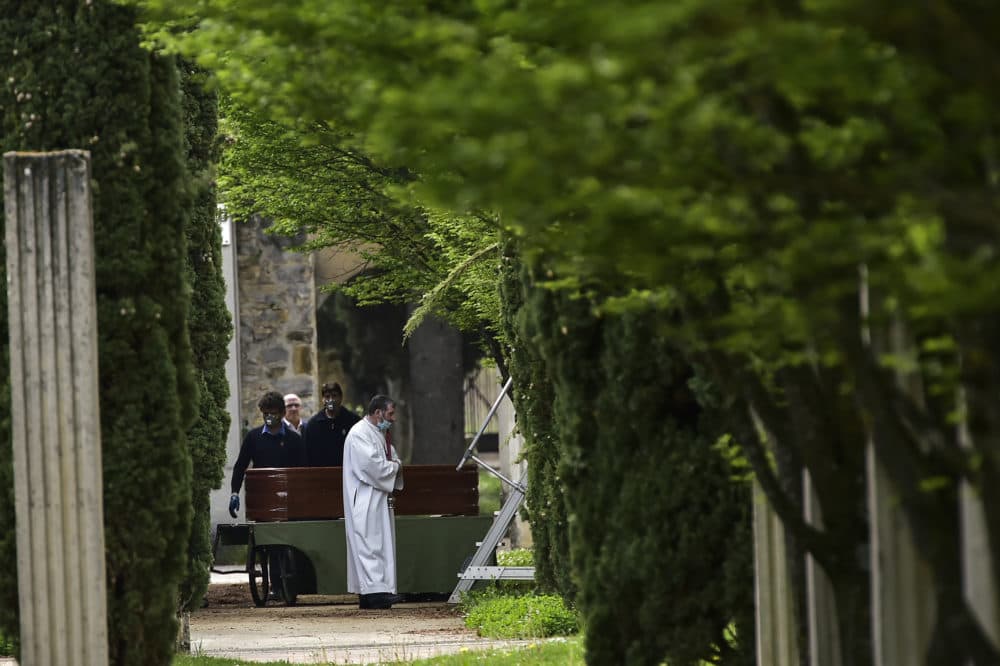Advertisement
Commentary
COVID-19 Won't Let Us Forget Our Maddening, Precious Mortality

Every morning, Americans wake up to news of a rising death toll from the coronavirus. We hit the refresh button and the numbers snake upward. Right about now, many of us might wish that we could trade places with a hydra -- the famed aquatic creature that scientists believe to be immortal — even for a bit, while we catch our breath. Left to its own devices, the hydra’s cells regenerate endlessly, making it impervious to death. From inside our frayed, shrink-wrapped lives, that sounds pretty good.
The unfolding COVID-19 pandemic magnifies a fact that usually dwells in the basement of our consciousness: We spend our entire lives under the shadow of mortality. Just in this moment, all of us are being made acutely aware of it. Culturally, we work so hard to uphold the boundary between life and death, and the events of the last few weeks are making that line appear unnervingly thin. Might we use the shock of this reality check to embrace our limited time here?
As an anthropologist, I study the cultural dimensions of death and dying. Here’s one thing my research has taught me: When human beings try to sidestep their mortality, when they attempt to deny death, facing its presence becomes incredibly painful. In societies where death is a subject of everyday conversation and where people spend time preparing for the end of their life, there’s a far greater acceptance of death. Relegating death to the outskirts of our minds means we will be blindsided when it happens, as it invariably does.
If death has become the enemy, then we will always be losing the war.
As a society, we gravitate toward fantasies of immortality. Some are benign, like obsessing about hydras and anti-aging creams. Others, less so, because they prevent us from admitting the realities of age-related decline and infirmity. I’m thinking of efforts to download a person’s brain so they can continue to live virtually after death. There’s cryonics, of course, the practice of freezing and storing bodies or body parts in the hope that future scientists will thaw them and bring them back to life. The latest incarnation of our thirst for eternal life? Ghost bots, computer-generated simulations of the deceased that can interact with the living.
These fantasies aren’t surprising in a culture where death has become nearly invisible — tucked away in nursing homes and hospitals, muzzled in everyday conversation, outsourced to funeral professionals. But it’s not just that we usually don’t see death up close. In this country, the end of life has become so medicalized that death is often viewed as a failure, rather than as an integral part of life.
As Atul Gawande writes in Being Mortal, “In the past few decades, medical science has rendered obsolete centuries of experience, tradition, and language about our mortality and created a new difficulty for mankind: how to die.” If death has become the enemy, then we will always be losing the war.
One question I liked to ask my students is whether they could ever imagine becoming immortal.
A few years ago, I created a hands-on seminar on death and dying for students at my university. Rather than shield them from their mortality, I wanted to give them the tools to explore their own relationship to it. As part of our studies, we staged an in-class Death Café, a gathering over coffee and cake with the purpose of talking about death. One question I liked to ask my students is whether they could ever imagine becoming immortal. Their answers blew me away each time.
Before committing, they typically haggled for specifics: Would they alone be immortal or would everyone else be too? Would they live forever as their 20-year-old selves or would they continue to age? Would they bear the traces of normally fatal accidents?
Then, almost without fail, the answer: Eternal life? No thanks. Even at 20, they worried that an endless life would turn into a grueling reenactment of "Groundhog Day," that they would ultimately get tired of living, that life around them would become unrecognizable with the passing of time — especially as they bore witness to a dying planet. What incentive would they have to grow into and better themselves? To leave behind a legacy? The whole point of life, they felt sure, was that it was finite.
In this moment of crisis, we're maddened and distraught by the magnitude of the deaths around us. Can we also take these feelings as an invitation to rethink our societal approach toward death, to start rebuilding our awareness of life as a transient gift? Can we use this time to marinate in the truth of our mortality and discover the freedom and potential in that? We might as well try.
